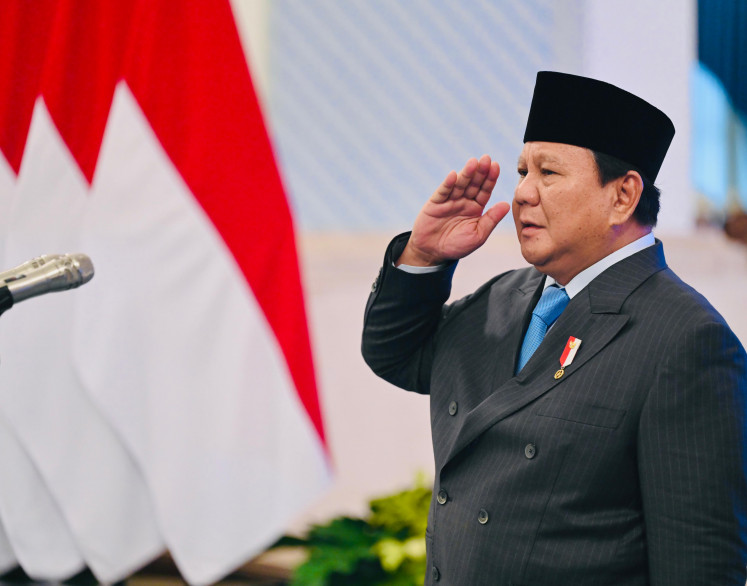Popular Reads
Top Results
Can't find what you're looking for?
View all search resultsPopular Reads
Top Results
Can't find what you're looking for?
View all search results‘Si Juki’ discovers its intellectual property value
Coming soon: a poster for the upcoming 2D animation film Si Juki the Movie
Change text size
Gift Premium Articles
to Anyone
Coming soon: a poster for the upcoming 2D animation film Si Juki the Movie. (Courtesy of sijuki.com)
Bucktoothed with unkempt hair and without super powers, but with the ability to drive people mad with his crazy eyes and witty opinions, a comic character is becoming hugely popular among young Indonesians, especially male.
Si Juki may not be Bart Simpson, who already has his own toy brick empire, but considering the current exposure of the iconic character, it may soon be on par with its American counterpart.
Started as a comic strip on Facebook five years ago, Si Juki has appeared in comic books, merchandise, toys, a South Korean web comic, a YouTube animation series, a mobile game app and, in the latest venture, an animation film.
Si Juki The Movie is to be released next year, and Juki creator and film director Faza Meonk promises it will be epic both in terms of its story and the visualization.
Faza has engaged Bandung-based animator Daryl Wilson for the project.
The film was produced by Frederica of Falcon Pictures, the production house of blockbusters Comic 8 and My Stupid Boss.
The first peek into the film was offered at the recent Popcon Asia 2016 in Jakarta, Indonesia’s annual pop culture festival that has grown along with the creative industry for four years running, with Si Juki as its poster boy.
While the festival serves as a window to the works of home talents, and lately their Asian counterparts, it promotes intellectual property (IP) rights and builds an ecosystem for creators and the industry to monetize IP creation.
Faza, for example, makes around Rp 60 million (US$ 4,500) a month in royalties from Si Juki alone.
Under the IP management firm Pionicon he founded, there are other characters for different market segments — si Bedil for the religious market, Little Manka for little girls, Tuti and Friends for their older sisters, and many others.
“It staves off the general perception that comic artists could not make a living out of their works,” said the winner of the Global Popularity Award 2015, held last December by LINE Webtoon, a web comic mobile app.
Si Juki was the first Indonesian IP creation invited to join the Seoul-based platform when the latter extended its service to Indonesia last year.
It now has more than 6 million active users per month in Indonesia, the highest among LINE Webtoon platforms globally.
So far, the platform has published 88 titles for the Indonesian market, 36 of the ongoing 52 titles were made by Indonesian artists — the most popular of which is Eggnoid by Bandung-based Archie the Red Cat.
LINE Webtoon founder Kim Jun-koo said the platform had been established in 2004 as a solution for the declining comic industry in the country.
“It is my vision to create a platform for comic lovers and at the same time support creators and link them up with readers worldwide,” he said at a press conference during Popcon Asia, held from Aug. 12 to Aug. 14.
The platform has changed the industry landscape, opening up opportunities for creators to see their works go to print or used in games, animation or live action film.
Eggnoid was one of the Indonesian titles printed for the Thai market, besides Annisha’s My Pre-Wedding.
Soon to be turned into a live action film is Lookism, the most popular comic title in South Korea created by model and entrepreneur Park Tae-joon.
“We have a commitment to support Indonesian local talents and we want to grow together with our Indonesian market,” said Kim.
“While we provide a platform for them to publish their works regularly, we also guarantee competitive compensation and expose them to the international audience.”
Aside from royalties, work contracts also entitle the creators to monthly retainers, which Kim said was a way to help them focus on the series “without being worried about basic necessities”.
Archie, who got his contract after winning the platform’s competition last year, said the payment system and the exposure to opportunities worldwide gave artists the confidence to create comics as a profession.
“I make more than enough today compared to when I started in high school. If previously I took office jobs to make a living, making comics is no longer a hobby now.”
-----------
Faza Meonk, Si juki creator
As a proud father, Faza Meonk won’t fuss over the fact that his comic character Si Juki has its own Wikipedia page, but none for him. In fact, that’s what he had wished for.
“If Japan has Doraemon and the US has the superheroes, I hope Indonesia also has comic character that could turn the creative economy and become a branding tool for the country,” he said.
“We used to have hand-puppet characters Unyil and Si Komo back in the 1980s and 1990s but because they were not well managed not many of the current generation know them.”
The 26-year-old had established his startup business Pionicon in 2012 to achieve that dream, by facilitating comic artists to get their IP content find a market or create their own market while bridging them to the industry — publishers, producers, game company and media.
“I’m not looking for money doing this but rather seeing local IP get the respect from its own people. I took the business model applied on Japanese comic series One Piece in which creator Eiichiro Ooda received profit from the characters anytime they were used in action figures, merchandise, games or animation series.
“When we thought of an icon to work on the business model, we picked Si Juki which at that time had been popular.”
Born in Bandung on Aug. 23, 1990 as Faza Ibnu Ubaidillah, who was nicknamed Meonk by his friends over his infatuation to cats — he talked to and gave names to all the stray cats in his campus, he was aspired to become a comic artist since in the elementary school.
He would make a comic book and sold copies to his school friends, but it changed as he picked animation subject at Depok-based vocational high school Cakra Buana on TV broadcasting.
“I thought being an animator would make more money than a comic artist,” said Faza, who took the works of Benny & Mice and Eko S. Bimantoro (Komik Rada Lucu) as his reference for the visual of his comic character.
While studying at Visual Design and Communication Faculty at Bina Nusantara University, he could not help but stating his opinion on his friends and people he met around the campus which he posted through Facebook account DKV4. Si Juki, a portmanteau of juru hoki, or luck master, was born.
It was a campus joke, but it gone viral. The comics was made to print titled Ngampuss!!! in 2011 by Bukune publisher with Si Juki as one of the main characters but later Faza decided to try his luck on that character. What happened next was history.
Now that Si Juki got its international readers, Faza put in the stuff unique to Indonesia to his works.
The mobile game he made in collaboration with Indonesian game company and publisher Touchten Games, for example, Si Juki: Kerokan Master Legend requires players to draw a certain pattern on the back of a body supposedly helps to release the “wind” — an Indonesian folk cure for cold.
Pionicon also worked with Japan’s Asahi Productions (Mobile Suit Gundam, Naruto Shippuden, One Piece) to produce its Spectra Project that comprised three options of stories for public to choose from.
They were The Secret of Aura about ghost story in school, Azra and the Minang Family about a family running a Minang food restaurant and Play and Boom that sees a journey of two boys becoming YouTubers.
Faza, who is now a lecturer at his campus and often traveled around the country to talk about entrepreneurship and creative industry and become a guest speaker overseas, still have a dream of creating new characters with international appeal.
“I love music and I want to intertwine animation with music the like of the singing Hatonemiku [Hatsune Miku],” he said.
But it could wait as he still concentrated on the 2D animation film Si Juki the Movie, to be released next year.
“If it became a success, others would follow suit and in turn the animation industry would grow even more.”
Kim Jun-koo, LINE Webtoon founder
The self-proclaimed comic geek was the man behind the revolution of comic industry worldwide. As the traditional comic industry in South Korea being hit by rampant copyright infringements, in 2004 the country’s top search portal NAVER created webcomic site and later moved it to its messaging tool LINE to reach out international readers.
The free platform LINE Webtoon is accessible through Webtoons.com and mobile applications in iOS and Android that give users new experiment of reading comics just by intuitive scrolling from top to bottom on touch screen.
The platform users also have the option to read the webcomic contents in multiple language.
It is now the home of 200 professional comic artists and 140,000 amateurs with 35 million active readers worldwide, including 6 million in Indonesia.
While readers could enjoy comic genres and styles so diverse for free, the platform provides more benefit to the webtoonists. As paid partners, they received handsome sum of monthly retainers with the potential to get more depends on the number of audience and readership.
“The monthly payment makes the creators stable financially and so they can concentrate on their works. And after putting in the business models, such as going on print, animation series or TV drama series, they get more incentives.
“In Taejoon case, he makes much and much money than I do,” said Kim, referring to Park Tae-joon, the creator of Lookism. The ongoing series was currently the most popular in South Korea.
Now LINE Webtoon has its Challenge League event to scout new talents, Kim took the extra mile to personally approach the artists to join in the platform on its first years of service.
“I know all the South Korean creators on LINE Webtoon in person. We’re like family, we call each other brothers. As a matter of fact, I spend more time with them.
“I hope we could get more readers in Indonesia and be more attractive to the content providers. That will be our focus now before we expand collaboration with other platforms which will benefit them more.”
Park Tae-joon
The webtoonist was still surprised by the readers’ enthusiasm over Lookism, currently the most popular comic series in South Korea.
The story, which was inspired by his own experience, follows a student who was bullied for being ugly until he woke up one day to find himself has turned into a handsome-looking guy.
“It wasn’t meant to deliver a message on anything, but apparently the readers learned something out of the story,” said the 31-year-old.
Taejoon found his passion in drawing since 5 and had become amateur illustrator as well as the model for his own Aboki online shop before his debut comic Lookism won the challenge event in LINE Webtoon.
“I’m preoccupied with making comics now my online shop sees decreasing revenue. I think I have to return as the model again.”
With his popularity rising, he is also known as host for TV programs and would make his debut as an actor — playing the main character of his own comic.
“I’m happy but also shy by my popularity among Indonesian readers. I will continue to make diverse comics with more appealing characters and stories. It’s my focus now. If it’s not because of making comics, I wouldn’t have these wide opportunities.”
Archie the Red Cat
The creator of Eggnoid, a romantic comedy which according to Kim Jun-koo was touchy for its deep narration, was actually a 30-year-old talkative and witty woman.
She protected her real name after a bad experience with internet bullies in the past and preferred to be known by her pen name, but more than willing to reveal other things.
With 1.4 million of subscribers to her series, Archie — who loves red color and cats — said the story was recycled from her previous work she submitted for a comic challenge held by a magazine in 2001.
The Bandung-based artist took part in LINE Webtoon Global Challenge Awards last year because all of her fellow artists joined.
“It was my first time making comics in colors,” said the graduate of Arts Faculty in the state’s Indonesian Education University.
She won the award and become the paid partner of the webcomic platform, enjoying the monthly retainer she said had changed people perception believing that comic artist was always poor.
“From my previous comic books which had been published I only received one-time royalty fee and I had to find other jobs to make a living.
“I can be what I’m now because of comics. I want to be like Park Tae-joon who traveled overseas to talk about his work. It’s my next goal.”
— JP/Tertiani ZB Simanjuntak










